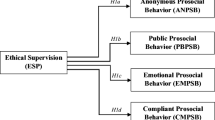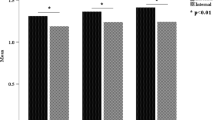Abstract
Prior research has shown a pronounced self-orientation in students of business and economics. This article examines if self-orientation can be alleviated by a focus on prosocial values in business education. In a cross-sectional design, we test the prosocial behavior and values of bachelor students at the beginning and the end of a traditional 3-year business administration program. We compare their behavior with the behavior of two different groups: students from an ethically-oriented international management school and students from a social work program of equal length. The results showed that students of business administration show less prosocial behavior in a dictator game than students in the other two groups. This difference is larger between final-year students than between first-year students. According to the results of the Schwartz Value Survey, the Inglehart Index, and a scale for preferences for distributive justice, students in the three disciplines differ substantially in prosocial values, but there is no significant difference between first and last semester students of the same discipline. We conclude that there is no transmission of self-oriented behavior through self-oriented values emended in traditional business education curricula. Instead, students seem to select academic programs according to their personal and preexisting social orientations.




Similar content being viewed by others
References
Baird JS (1980) Current trends in college cheating. Psychol Schools 17:515–522
Caplan B (2002) Systematically biased beliefs about economics: robust evidence of judgemental anomalies from the survey of Americans and economists on the economy. Econ J 112(479):433–458
Carter JR, Irons MD (1991) Are economists different, and if so, why? J Econ Perspect 5(2):171–177
Forsythe R, Horowitz JL, Savin NE, Sefton M (1994) Fairness in simple bargaining experiments. Games Econ Behav 6:347–369
Frank RH, Gilovich TD, Regan DT (1993) Does studying economics inhibit cooperation. J Econ Perspect 7(2):159–171
Frank R, Gilovich TD, Regan DT (1996) Do economists make bad citizens? J Econ Perspect 10(1):187–192
Frey BS, Meier S (2003) Are political economists selfish and indoctrinated? Evidence from a natural experiment. Econ Inq 41(3):448–462
Frey BS, Meier S (2005) Selfish and indoctrinated economists? Eur J Law Econ 19(103):165–171
Frey BS, Pommerehne WW, Gygi B (1993) Economic indoctrination or selection? Some empirical results. J Econ Educ 24(3):271–281
Gandal N, Roccas S, Sagiv L, Wrzeniewski A (2005) Personal value priorities of economists. Hum Relat 58(10):1227–1252
Glenn JR (1992) Can a business and society course affect the ethical judgment of future managers? J Bus Ethics 11(3):217–223
Hamilton RF, Hargens LL (1993) The politics of the professors: self-identifications, 1969–1984. Soc Forces 71(3):603–627
Inglehart R (1971) The silent revolution in europe: intergenerational change in post-industrial societies. Am Polit Sci Rev 65(4):991–1017
Inglehart R (1981) Post-materialism in an environment of insecurity. Am Polit Sci Rev 75(4):880–900
Jacobsen KJ, Eika KH, Helland L, Lind JT, Nyborg K (2011) Are nurses more altruistic than real estate brokers? J Econ Psychol 32(5):818–831
James T, Soroka L, Benjafield JG (2001) Are economists rational, or just different? Soc Behav Personal 29(4):359–364
Kahneman D, Knetsch JL, Thaler RH (1986) Fairness and the assumptions of economics. J Bus 59(4):S285–S300
Marnburg E (2003) Educational impacts on academic business practitioner’s moral reasoning and behaviour: effects of short courses in ethics or philosophy. Bus Ethics Eur Rev 12(4):403–413
Marwell G, Ames R (1981) Economists free ride. Does anyone else? J Public Econ 15:295–310
McCabe DL, Butterfield KD, Trevino LK (2006) Academic dishonesty in graduate business programs: Prevalence, causes, and proposed action. Acad Manag Learn Educ 5(3):294–305
McDonald GM (2004) A case example: integrating ethics into the academic business curriculum. J Bus Ethics 54(4):371–384
Phillips SM (2004) Ethics education in business schools: report of the Ethics Education Task Force to AACSB International’s Board of Directors, Tampa, FL
Racko G (2010) On the normative consequences of economic rationality: a case study of a Swedish Economics School in Latvia. Eur Sociol Rev 27(6):772–789
Ritter BA (2006) Can business ethics be trained? A study of the ethical decision-making process in business students. J Bus Ethics 68(2):153–164
Schmitt M, Maes J, Schmal A (1995) Gerechtigkeit als innerdeutsches Problem: Einstellungen zu Verteilungsprinzipien, Ungerechtigkeitssensibilität und Glaube an eine gerechte Welt als Kovariate. University of Trier, Trier
Schmitt M, Maes J, Schmal A (1997) Gerechtigkeit als innerdeutsches Problem: Analyse der Meßeigenschaften von Meßinstrumenten für Einstellungen zu Verteilungsprinzipien, Ungerechtigkeitssensibilität und Glaube an eine gerechte Welt. University of Trier, Trier
Schwartz SH (1992) Universals in the content and structure of values: theoretical advances and empirical tests in 20 countries. Adv Exp Soc Psychol 25:1–65
Selten R, Ockenfels A (1998) An experimental solidarity game. J Econ Behav Organ 34(4):517–539
Stigler GJ (1959) The politics of political economists. Q J Econ 73(4):522
Wang L, Malhotra D, Murnighan JK (2011) Economics education and greed. Acad Manag Learn Educ 10(4):643–660
Weber J (1990) Measuring the impact of teaching ethics to future managers: a review, assessment, and recommendations. J Bus Ethics 9(3):183–190
Wynd WR, Mager J (1989) The business and society course: Does it change student attitudes? J Bus Ethics 8(6):487–491
Yezer AM, Goldfarb RS, Poppen PJ (1996) Does studying economics discourage cooperation? Watch what we do, not what we say or how we play. J Econ Perspect 10(1):177–186
Author information
Authors and Affiliations
Corresponding author
Additional information
Publisher's Note
Springer Nature remains neutral with regard to jurisdictional claims in published maps and institutional affiliations.
Rights and permissions
About this article
Cite this article
Petersen, M., Keller, M., Weibler, J. et al. Business education: Does a focus on prosocial values increase students’ pro-social behavior?. Mind Soc 18, 181–190 (2019). https://doi.org/10.1007/s11299-019-00220-5
Published:
Issue Date:
DOI: https://doi.org/10.1007/s11299-019-00220-5




